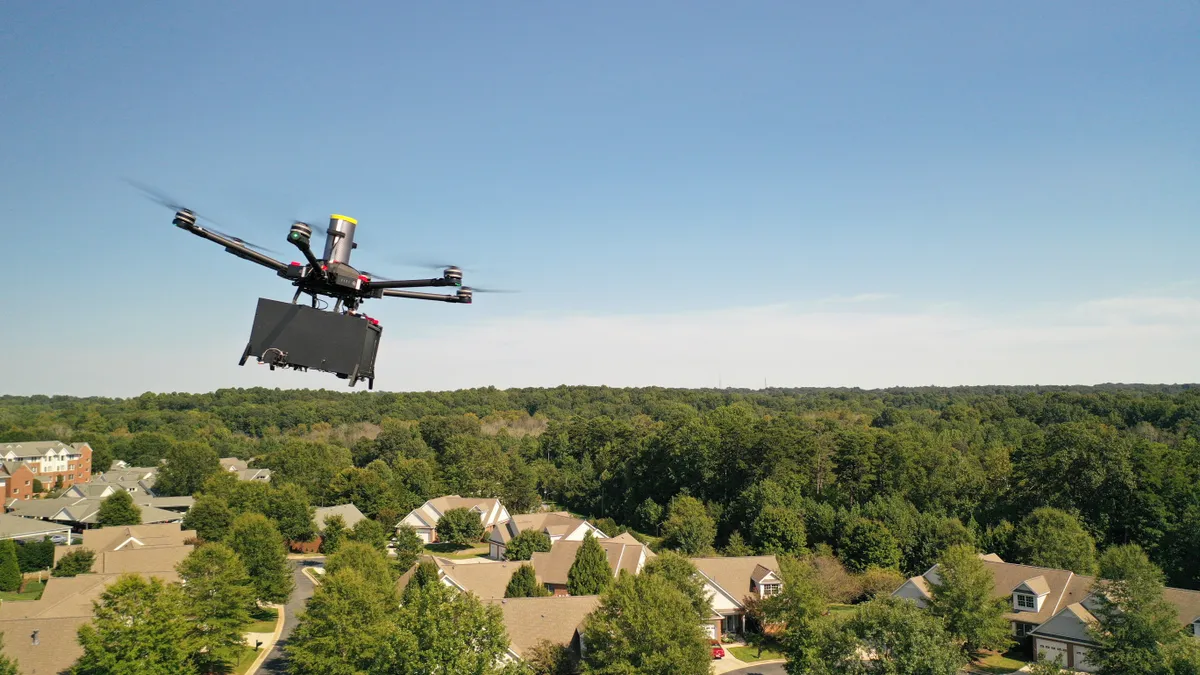Dive Brief:
- Brinker International has expanded its partnership with drone delivery company Flytrex, which now offers its service in Granbury, Texas, outside of Dallas-Fort Worth, according to a press release sent to Restaurant Dive.
- Drones will offer five-minute delivery of Brinker's brands, including two virtual brands It's Just Wings and Maggiano's Italian Classics. Meals are delivered to front and backyards.
- The expansion into Texas follows Flytrex's domestic debut in North Carolina in September 2020. Since then, the drone company has expanded into two additional North Carolina markets, including a delivery station in Holly Springs Towne Center, where the company delivers from Brinker’s It’s Just Wings brand.
Dive Insight:
The expanded partnership will support Brinker’s growing off-premise business, which includes about 15% from the delivery channel.
"As we continue to drive awareness and grow our virtual brand, It’s Just Wings, we continue to explore and leverage technology and innovation. With a focus on guest experience and convenience — alongside our killer wings — this new outpost in partnership with Flytrex is another exciting step in the right direction," Wade Allen, SVP, Innovation, Brinker International, said in a statement emailed to Restaurant Dive.
Brinker isn't the only restaurant chain feeling out the drone delivery space. El Pollo Loco initiated a test with Flytrex last summer in Southern California. McDonald's dabbled in the space with Uber in 2019, and Starbucks and Domino's are also testing the service. Drone deliveries are also accelerating in retail, with tests from Walmart, Kroger, UPS and Amazon underway.
Flytrex's expansion both into a new market and with Brinker International are significant indicators of progress for the company and for drone delivery in general. It follows another major vote of confidence from the Federal Aviation Administration in January in which Flytrex was named North Carolina Department of Transportation’s partner for its FAA Beyond program. That partnership enabled Flytrex to ramp up its service to 10,000 homes in the state.
Drones not only speed up those deliveries — Flytrex claims its average delivery time is 3 minutes — they require less labor, which makes the model cheaper. A 2019 study found that automated delivery could reduce delivery costs by up to 90%, for example. Drone delivery can also open up delivery to underserved neighborhoods, according to the press release.
Operators are also likely to find the lower-cost model appealing, as well as the ability to fulfill more orders in less time. Automation is also providing a bit of a relief for operators as they continue to grapple with labor pressures. The hospitality industry experienced a higher quits rate in February than other industries, for instance, with 6% of the workforce walking away, compared to a 2.9% quits rate across all industries. About 50% of U.S. restaurant operators said they plan to use automation technology to help fill labor gaps in the next two to three years.
Drone delivery is still very much on the ground floor and some outstanding questions remain, such as its viability in dense, urban settings. There are other autonomous delivery options entering the market, such as Nuro and Starship Technologies, which also save on labor costs without crowding airspace or creating privacy concerns. The autonomous last-mile delivery market is projected to grow at a rate of 21.5% annually through 2030, according to ResearchandMarkets.com. Flytrex's recent milestones and fund raising indicate drones will very much be a part of that growth.














